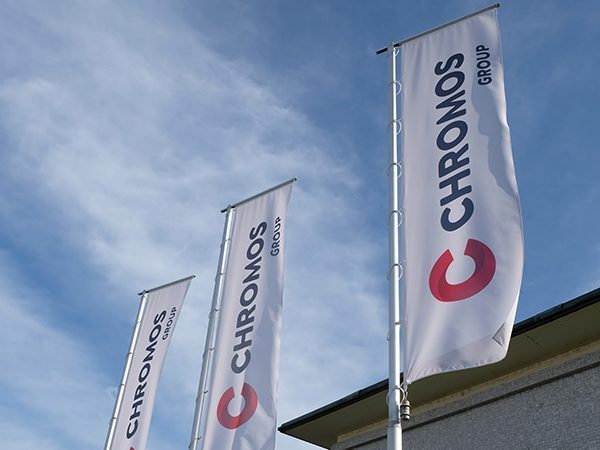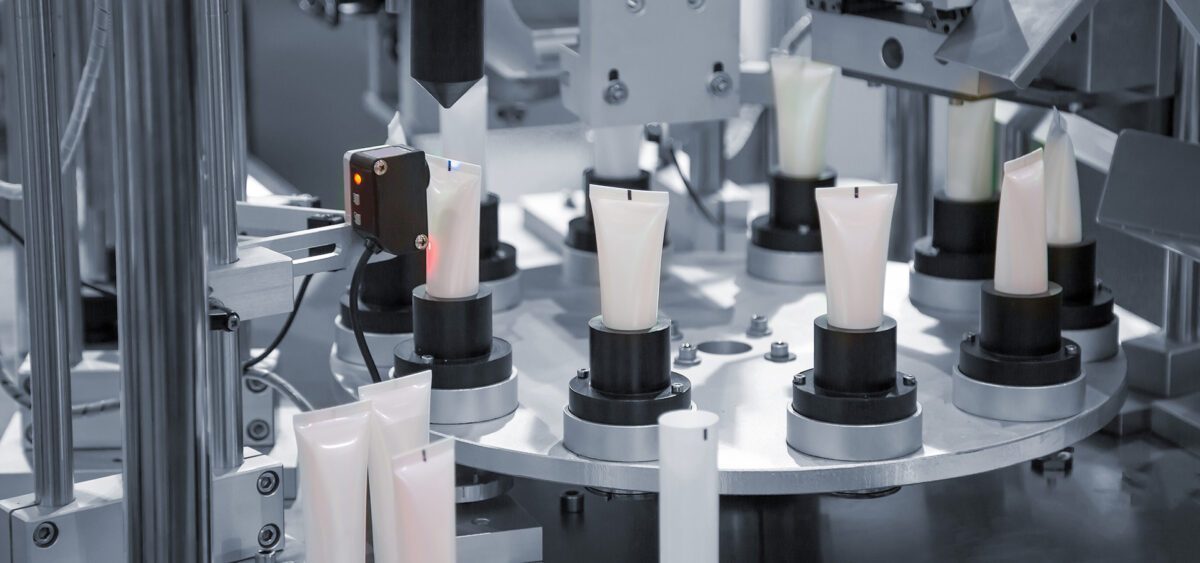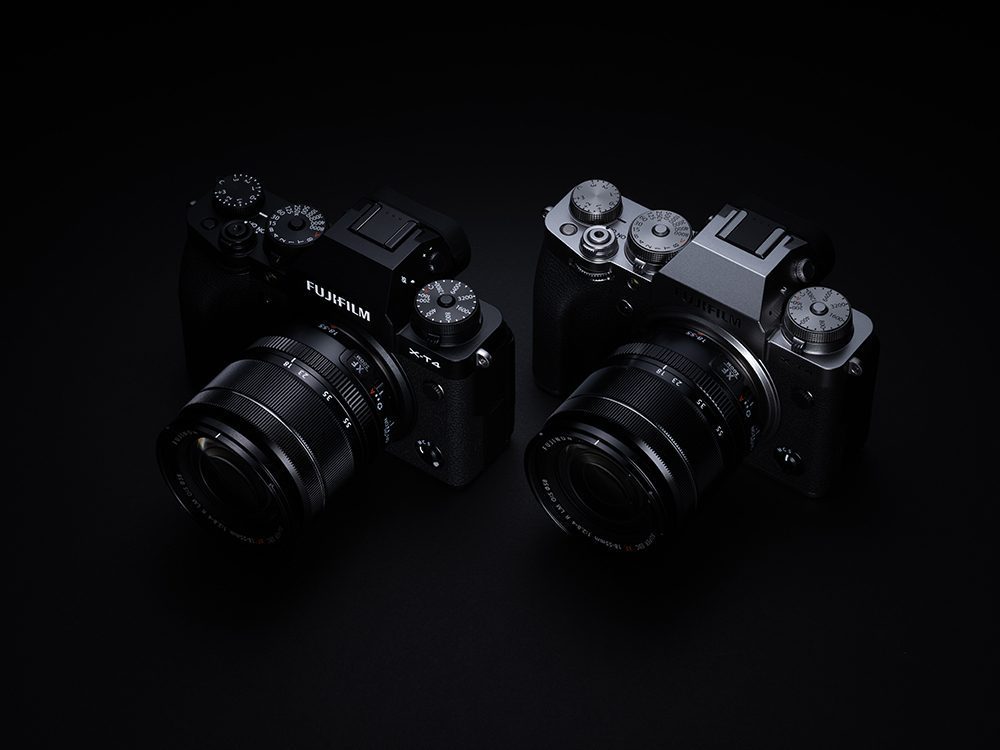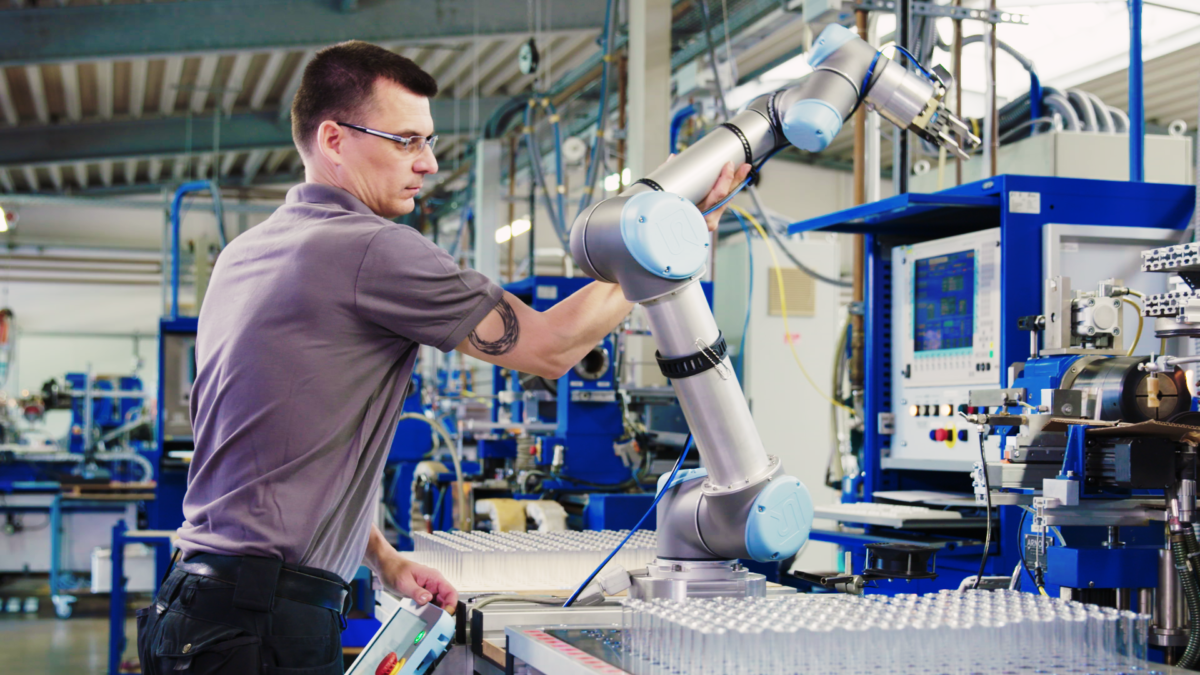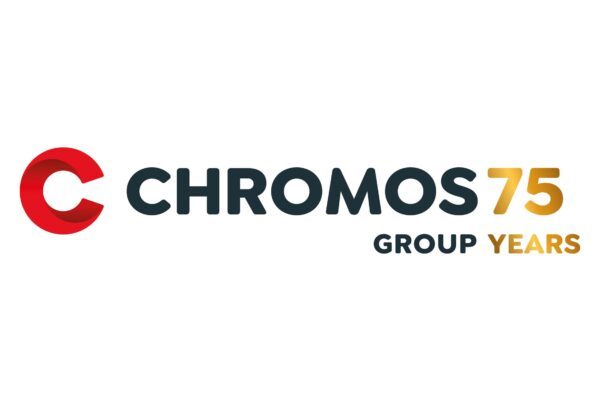In the middle of the year, Chromos and Fujifilm Switzerland became CHROMOS Group AG. This was accompanied by a completely new appearance. This leads directly to the classic question: evolution or revolution? Daniel Broglie, co-owner and Head of Sales + Services, says clearly: "Evolution!" It could be described in another way: the preliminary culmination of a transformation process that not only reveals a great deal about the CHROMOS Group, but also highlights the change processes that can be observed. The company has deliberately positioned itself as a
"bridge builder".
Text: Paul Fischer / Picture: CHROMOS Group AG
Why should we even bother with the CHROMOS Group's new look? Because Daniel Broglie's answer to the question "What will change for customers from the graphic arts industry?" leaves nothing to be desired in terms of clarity: "Nothing!" Of course, a closer look at the topic reveals that this is a vast oversimplification. Customers from the graphic arts industry will retain their familiar contacts and the various services will be provided in exactly the same way as before the name change. Nevertheless, the CHROMOS Group 2020 is no longer the same Chromos as it was just a few years ago. And the structures that have now been implemented are intended to ensure that the CHROMOS Group continues to develop successfully with the market over the coming decade. The new company structure is the result of strategic considerations that have been carefully developed by the Board of Directors and management over the past two years.
All in the same boat
The "new" CHROMOS Group introduces itself to its existing and potential customers as follows: "The Chromos Group is a leading solution provider for the graphic arts, packaging, food, beverage, photo-film, broadcast, medical, pharmaceutical and processing industries." Sales are divided into six divisions: Printing, Packaging, Industrial, Kelva Web Cleaning, Fujifilm Photo, Service. Organizationally, there is now only one company, CHROMOS Group AG, everything else has disappeared. The name Fujifilm is now just a "brand". So is the change to the CHROMOS Group nothing more than a well-hidden cost-cutting measure?
Daniel Broglie clearly denies this: "It is not a cost-cutting exercise. Many areas were already combined before the new structure: the HR department, accounting, logistics, IT. But we still had two companies, Chromos AG and Fujifilm Schweiz AG. The Imsag AG service organization was integrated into Chromos AG back in 2019 as part of the simplification process. Each company had its own established structures and processes. Of course, these were adapted to each other over the years, but there were still differences in the details. Take the HR department, for example. There was one person who dealt in depth with Chromos AG and another person who mainly looked after Fujifilm Switzerland. That's why these people couldn't simply take on vacation replacements for each other. And this was the case in all areas. Even though we actively coordinated the different parts of the company, some saw themselves more as "Chromos" and others more as "Fujifilm". With the new organizational structure, we now only have a Marketing, a Sales/Service and an entire 'Corporate' division with HR, Logistics, IT, Finance and Customer Service. We started a few years ago with the motto "One Company". With the new structure, we are now all in the same boat and are working together to achieve our goals. The new organizational structure means that we don't have a surplus of staff; on the contrary, we can use the existing potential more efficiently." And the cost-cutting measures implemented last year? Daniel Broglie: "In 2019, we divested ourselves of the LFP business and reduced our forces at Fujifilm in the medical sector. These were decisions that were made independently of the new organizational structure."

Continuous change process
How the organization has changed can be seen very vividly in the role of the two brothers Christian and Daniel Broglie. Before the new structure, one was Managing Director of Fujifilm Switzerland, the other Managing Director of Chromos. Both managed their companies and accessed the central services mentioned above. Both had to cover the entire spectrum of their respective companies in their decision-making processes. In the new organizational structure, the brothers' management functions are more focused: Daniel Broglie is the "foreign minister", so to speak, and is responsible for everything that has to do with external partners and customers. Christian Broglie, on the other hand, can be described as the "Minister of the Interior".
Daniel Broglie uses a specific example to explain what this means: "We have bought the property in Dielsdorf, where we were previously in a tenancy, from the landlord. Over the next twelve months, we want to carry out structural measures and adjustments. With the old constellation, both Christian as Managing Director of Fujifilm Switzerland and I as Managing Director of Chromos would have managed the project together. With the new structure, this is entirely Christian's job. Conversely, I am now responsible for the marketing of Fujifilm Photo, which was previously with my brother."
Looking at it from the outside, you might say: "That's nice. But is this really the big one?" Daniel Broglie replies: "No, it's not the big one, and that's why we are communicating all this to our customers and partners as an evolution and not a revolution. But it is an important intermediate step in an ongoing development that we have been strategically supporting for years with constant questioning." Specifically, Daniel Broglie is referring to the operational management of the company by the two brothers, accompanied by their father Rolf and the rest of the Board of Directors. Daniel Broglie explains: "CHROMOS Group is the result of intensive thought and discussion. We look at the markets, try to predict how they will develop and adapt our structures accordingly. More precisely: we are increasingly trying to anticipate developments. In this situation, we have to be flexible and fast. For example, the CHROMOS Group project was fully implemented in less than twelve months after it was approved by the Board of Directors. That was and is a pretty fast pace for everyone involved."
There are constants that are completely independent of current developments. According to Daniel Broglie, one rule is: "Every area must be profitable, there are no cross-subsidies." And: "We are in a triangle between our customers and our partners/suppliers." Not much has actually changed here over the decades. Daniel Broglie relates an anecdote: "My father, Rolf, showed me a letter from his father from 1972, when he took over the management of the company. The letter mainly contained advice and tips on how to deal with the aforementioned triangle in general. I was amazed at how relevant my grandfather's recommendations still are today."
Bridge builder
The CHROMOS Group describes itself as a "solution provider" in 2020. Looking back in history, a different self-image has developed here. At the turn of the century, the company saw itself more as a "trading company". Even today, supplying companies that produce print products is one of the core businesses. Another mainstay, as it was twenty years ago, is the photography business. However, the focus has shifted. The packaging segment has become more important, also in the capital goods sector. Digital printing, still a promise in 2000, is "daily business". The offset business, a linchpin in the past, is no longer as dominant, but by no means a "quantité nég-ligeable", on the contrary. The CHROMOS Group now distributes the offset machines of the Japanese RMGT Group throughout the German-speaking world. That is another change. The company was already "grazing" across the border at the turn of the century, but the management of the entire DACH region is becoming increasingly important. HP Indigo products have also been sold exclusively in Switzerland and Austria for several years now. Daniel Broglie: "In certain markets, we have to operate in the entire German-speaking region in view of the structural changes. For example, in view of the size of the markets and the associated potential, it no longer makes economic sense to sell RMGT offset presses only in Switzerland or only in Austria. We are also responsible for RMGT's Europe-wide spare parts business, which we handle via our German subsidiary in Augsburg."
What has also changed is that a company the size of the CHROMOS Group can no longer survive on the sale of consumables alone. Customers demand complete solutions. Of course, this has its consequences. The classic "vendor's tray" salesman has had its day. Daniel Broglie: "Our customers don't want a salesperson, they want a technology and solution consultant. It's no longer about selling machines, we have to think actively for and with our customers and show them perspectives. Of course, this is a comprehensive cultural change compared to the past. Without belittling the past, we now have much more technology expertise in the company, many specialists with a really in-depth understanding of technology. Understanding the market conditions of our customers is also becoming increasingly crucial. Our solution is only the right one if we can show our partners that they will be more successful with our solutions for their customers. In addition to know-how, it is therefore increasingly about demonstrating the overall business context for our customers. We simply have to have this in order to be able to operate successfully in this market. Technical developments, especially IT-based developments, are leaps and bounds, and the interrelationships are becoming increasingly complex. It is becoming increasingly difficult for most customers to see through this at all." This is precisely where another important component of the CHROMOS Group's success comes into play. Daniel Broglie: "All of our competitors are subsidiaries of international groups. They offer what their parent companies develop. We, on the other hand, have adapted the original trading house approach. We put together complete technological solutions that are tailor-made for our customers. As a solution provider, we also remain independent of our suppliers." However, the requirements for implementing this are much greater for complete solutions than for pure trading products. Daniel Broglie: "In view of the increasing complexity, we are increasingly becoming a bridge builder in the triangle of CHROMOS Group, customer, partner/supplier, actively supporting and connecting both sides."
2020 and beyond
The current year is of course an extremely difficult one due to Covid-19. Irrespective of this, the CHROMOS Group is pursuing the goals it has set itself. Even in markets that are not generally considered to be major growth markets. Focus is the magic word here. An example from Daniel Broglie: "With Fujifilm Foto, we are concentrating on the market of 'amateurs with professional requirements'. Of course, the traditional camera market is practically dead if smartphones are getting better and better in this area. But there is a growing target group of people who want more, and this is where we come in. The same applies to offset presses. It's a difficult market, but because we exclusively serve RMGT for the entire DACH region, we see growth potential. The same applies to Kelva web cleaning systems, a product that we manufacture in Switzerland. Here we work together with distributors worldwide." Or gaps are filled. The CHROMOS Group is the "European demo and training center for HP Indigo".
Covid-19 has so far set limits on development, but it is a valuable asset in times when large corporations are abandoning their national showrooms and training centers in favor of continental centers. The CHROMOS Group's involvement in segments that no longer have much to do with the graphics industry or the photography business is downright exciting. These are 3D printing and cobots. Our magazine has already reported on the CHROMOS Group's involvement in the 3D segment. Cobots (collaborative robots from Universal Robots), on the other hand, is a business that is currently being built up. Does this mean that the CHROMOS Group is moving away from its traditional core business? Daniel Broglie says no: "Our core business remains print, packaging and photography. But these markets are becoming increasingly complex, IT-heavy and cross-sectoral. 3D printing and cobots are industrial trends that will become increasingly important over the next few years. Such systems will also be used where our core business is today. At the same time, it enables us to grow into new markets as an independent technology and industrial solutions provider. Industrial companies are therefore becoming an increasingly important additional market for us." Another current project shows that the company is serious about this: as already mentioned, the CHROMOS Group has purchased the property in Dielsdorf. It is to be converted and expanded by the end of 2021 (Chromos will be 75 years old next year). An extensive investment that will go ahead despite Covid-19.
In conversation with Daniel Broglie, it becomes clear that the company's development is a permanent flow. The focus is on continuous further development, not on big announcements in between. Despite all this, it is quite conceivable that when looking back from the future, the transformation to the CHROMOS Group completed in 2020 will be perceived as an important milestone.
